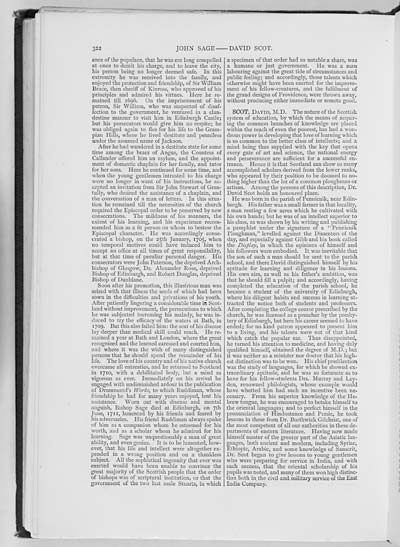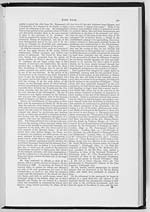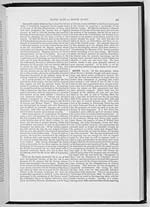322
ence of the populace, that he was ere long compelled
at once to demit his charge, and to leave the city,
his person being no longer deemed safe. In this
extremity he was received into the family, and
enjoyed the protection and friendship, of Sir William
Bruce, then sheriff of Kinross, who approved of his
principles and admired his virtues. Here he re-
mained till 1696. On the imprisonment of his
patron, Sir William, who was suspected of disaf-
fection to the government, he ventured in a clan-
destine manner to visit him in Edinburgh Castle;
but his persecutors would give him no respite; he
was obliged again to flee for his life to the Gram-
pian Hills, where he lived destitute and penniless
under the assumed name of Jackson.
After he had wandered in a destitute state for some
time among the braes of Angus, the Countess of
Callander offered him an asylum, and the appoint-
ment of domestic chaplain for her family, and tutor
for her sons. Here he continued for some time, and
when the young gentlemen intrusted to his charge
were no longer in want of his instructions, he ac-
cepted an invitation from Sir John Stewart of Gran-
tully, who desired the assistance of a chaplain, and
the conversation of a man of letters. In this situa-
tion he remained till the necessities of the church
required the Episcopal order to be preserved by new
consecrations. The mildness of his manners, the
extent of his learning, and his experience recom-
mended him as a fit person on whom to bestow the
Episcopal character. He was accordingly conse-
crated a bishop, on the 25th January, 1705, when
no temporal motives could have induced him to
accept an office at all times of great responsibility,
but at that time of peculiar personal danger. His
consecrators were John Paterson, the deprived Arch-
bishop of Glasgow, Dr. Alexander Rose, deprived
Bishop of Edinburgh, and Robert Douglas, deprived
Bishop of Dunblane.
Soon after his promotion, this illustrious man was
seized with that illness the seeds of which had been
sown in the difficulties and privations of his youth.
After patiently lingering a considerable time in Scot-
land without improvement, the persecutions to which
he was subjected increasing his malady, he was in-
duced to try the efficacy of the waters at Bath, in
1709. But this also failed him: the seat of his disease
lay deeper than medical skill could reach. He re-
mained a year at Bath and London, where the great
recognized and the learned caressed and courted him,
and where it was the wish of many distinguished
persons that he should spend the remainder of his
life. The love of his country and of his native church
overcame all entreaties, and he returned to Scotland
in 1710, with a debilitated body, but a mind as
vigorous as ever. Immediately on his arrival he
engaged with undiminished ardour in the publication
of Drummond's Works, to which Ruddiman, whose
friendship he had for many years enjoyed, lent his
assistance. Worn out with disease and mental
anguish, Bishop Sage died at Edinburgh, on 7th
June, 1711, lamented by his friends and feared by
his adversaries. His friend Ruddiman always spoke
of him as a companion whom he esteemed for his
worth, and as a scholar whom he admired for his
learning. Sage was unquestionably a man of great
ability, and even genius. It is to be lamented, how-
ever, that his life and intellect were altogether ex-
pended in a wrong position and on a thankless
subject. All the sophistical ingenuity that ever was
exerted would have been unable to convince the
great majority of the Scottish people that the order
of bishops was of scriptural institution, or that the
government of the two last male Stuarts, in which
a specimen of that order had so notable a share, was
a humane or just government. He was a man
labouring against the great tide of circumstances and
public feeling; and accordingly, those talents which
otherwise might have been exerted for the improve-
ment of his fellow-creatures, and the fulfilment of
the grand designs of Providence, were thrown away,
without producing either immediate or remote good.
SCOT, DAVID, M.D, The nature of the Scottish
system of education, by which the means of acquir-
ing the common branches of knowledge are placed
within the reach of even the poorest, has had a won-
drous power in developing that love of learning which
is so common to the better class of intellects; and a
mind being thus supplied with the key that opens
every gate of art and science, the national energy
and perseverance are sufficient for a successful en-
trance. Hence it is that Scotland can show so many
accomplished scholars derived from the lower ranks,
who appeared by their position to be doomed to no-
thing higher than the lot of a common ploughman or
artisan. Among the persons of this description, Dr.
David Scot holds an honoured place.
He was born in the parish of Pennicuik, near Edin-
burgh. His father was a small farmer in that locality,
a man renting a few acres which he cultivated with
his own hands; but he was of an intellect superior to
his class, as was shown by his writing and publishing
a pamphlet under the signature of a "Pennicuik
Ploughman," levelled against the Dissenters of the
day, and especially against Gibb and his book called
the Display, in which the opinions of himself and
his followers were embodied. It was inevitable that
the son of such a man should be sent to the parish
school, and there David distinguished himself by his
aptitude for learning and diligence in his lessons.
His own aim, as well as his father's ambition, was
that he should fill a pulpit; and accordingly, having
completed the education of the parish school, he
became a student of the university of Edinburgh,
where his diligent habits and success in learning at-
tracted the notice both of students and professors.
After completing the college course prescribed by the
church, he was licensed as a preacher by the presby-
tery of Edinburgh, but here his career seemed to have
ended; for no kind patron appeared to present him
to a living, and his talents were not of that kind
which eaten the popular ear. Thus disappointed,
he turned his attention to medicine, and having duly
qualified himself, obtained the degree of M.D.; but
it was neither as a minister nor doctor that his high-
est distinction was to be won. His chief predilection
was the study of languages, for which he showed ex-
traordinary aptitude, and he was so fortunate as to
have for his fellow-students Drs. Murray and Ley-
den, renowned philologists, whose example would
have whetted him had such an incentive been ne-
cessary. From his superior knowledge of the He-
brew tongue, he was encouraged to betake himself to
the oriental languages; and to perfect himself in the
pronunciation of Hindostanee and Persic, he took
lessons in these from Dr. Borthwick Gilchrist, one of
the most competent of all our authorities in these de-
partments of eastern literature. Having now made
himself master of the greater part of the Asiatic lan-
guages, both ancient and modern, including Syriac,
Ethiopic, Arabic, and some knowledge of Sanscrit,
Dr. Scot began to give lessons to young gentlemen
who were preparing for service in India, and with
such success, that the oriental scholarship of his
pupils was noted, and many of them won high distinc-
tion both in the civil and military service of the East
India Company.

![]() Universal Viewer |
Universal Viewer | ![]() Mirador |
Large image | Transcription
Mirador |
Large image | Transcription
![]()

